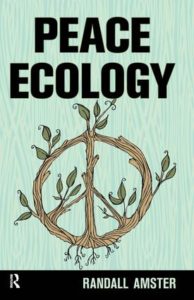Peace Ecology is…
 … a cutting-edge exploration of an emerging paradigm that links the essence of peace and nonviolence with the tenets of ecology and the principles of environmentalism. Looking at issues including food justice, water sharing, climate change, peace zones, and the free economy, this book considers examples and illustrations from around the world where people, communities, and nations are employing the teachings of ecology as a tool for mitigating conflict and promoting peace. Peace Ecology presents an integrative perspective that bears directly upon the most pressing issues of our time, constituting both the ecological realm of peace and the peacemaking potential of ecology. The volume examines the rich history, contemporary relevance, and transformative future potential inherent in this dynamic nexus of theory and action. Its overarching aim is no less than moving the current scarcity-conflict paradigm to one of cooperative resource management and, ultimately, toward peaceful coexistence both among ourselves and within the balance of nature.
… a cutting-edge exploration of an emerging paradigm that links the essence of peace and nonviolence with the tenets of ecology and the principles of environmentalism. Looking at issues including food justice, water sharing, climate change, peace zones, and the free economy, this book considers examples and illustrations from around the world where people, communities, and nations are employing the teachings of ecology as a tool for mitigating conflict and promoting peace. Peace Ecology presents an integrative perspective that bears directly upon the most pressing issues of our time, constituting both the ecological realm of peace and the peacemaking potential of ecology. The volume examines the rich history, contemporary relevance, and transformative future potential inherent in this dynamic nexus of theory and action. Its overarching aim is no less than moving the current scarcity-conflict paradigm to one of cooperative resource management and, ultimately, toward peaceful coexistence both among ourselves and within the balance of nature.
{ALSO AVAILABLE FROM AMAZON + B&N + eBooks + Thriftbooks + MORE}
2015 * 224 pp. * ISBN 9781612052977 * paperback
ENDORSEMENTS
“This book bridges divides that very much need to be bridged between peace activism and peace academia, and between peace advocacy and environmentalism. This is, in fact, a peace book for deep environmentalists and an environmental book for deep peace advocates.” — David Swanson, WarIsACrime.org
“Randall Amster lays bare the intimate connections between the war system and global environmental degradation, but rather than leaving us in despair he shows that these destructive relationships can be reversed, leading not only to our survival (currently in doubt) but to our flourishing in balance with a healthy biosphere – which is, indeed, our only hope.” — Kent Shifferd, author of From War to Peace: A Guide to the Next Hundred Years
“In Peace Ecology, Randall Amster delivers the urgent message that issues of peace and nonviolence are inseparable from those of ecological integrity and sustainability. He warns of the growing dangers of resource wars and scarcity-induced conflict, but at the same time offers a vision of hope, grounded in our basic human capacities for solidarity, cooperation, and caring concern for our home planet and our home places. Peace Ecology is an admirable synthesis of crucial information, thoughtful reflection, and much-needed inspiration.” — John Clark, Loyola University-New Orleans
“The critique of war and the continuum of structural violence in everyday life illuminate the path toward a more sustainable worldview and the creation of an ecology of peace. Randall Amster’s book Peace Ecology puts us on a transdisciplinary road in thought and action, moving us toward a peace that is much larger than a world without war.” — Dennis Lum, Fort Lewis College
“Wide-ranging and thought-provoking, Peace Ecology charts a positive way forward in these perilous times of climate change, persistent militarism, and growing inequality. In lucid prose, and based on significant research, Randall Amster provides an important antidote to apocalyptic despair. This book is must-reading in peace and environmental studies – and far beyond.” — Betsy Hartmann, Hampshire College
“Randall Amster applies his integrative mind to questions of war and environmental destruction, along the way drawing lines of connection to food sovereignty, community-building, justice, peace, and ecological well-being. The result is a refreshing – and bold – invitation to be proactive before the challenges that threaten human survival.” — Chellis Glendinning, author of Off the Map: An Expedition Deep into Empire and the Global Economy
REVIEWS
C. Hrynkow, “Review: Peace Ecology” (Journal for the Study of Peace and Conflict, January 2015): “Peace Ecology represents an important contribution at this juncture in human history. It is a well-written monograph, cites a number of significant examples, and addresses its important subject matter in an accessible manner.”
A. Fielder, “Fostering Hope in Calamitous Times” (Journal of Sustainability Education, November 2015): “a timely reminder that ecological literacy and peace studies provide a necessary hope for all humanity and a vehicle into which we can channel that hope into concrete action”
A. Brisman, “Book Review: Peace Ecology” (Contemporary Justice Review, 19:3, 2016): “shining a critical light on current issues while, at the same time, offering positive examples that integrate peaceful human-human efforts with just human-environment (ecological) outcomes … it is this balance between the practical and the utopian that renders Peace Ecology so compelling”
A. Gomes, “Book Review: Peace Ecology” (Peace Review, 28:3, 2016): “…not just a scholarly critique of war, militarism, and neoliberal capitalism. It is also a profound ‘wake up call to action’ and an activist manual for nurturing nonviolent, peaceful and sustainable living.”
D. Ostergren, “Choice Reviews” (Choice, April 2015): “Peace Ecology is a thorough contribution to the peace and the environment/ecology literature that creatively spans multiple disciplines and content areas…. A useful resource for students and researchers. Recommended.”

